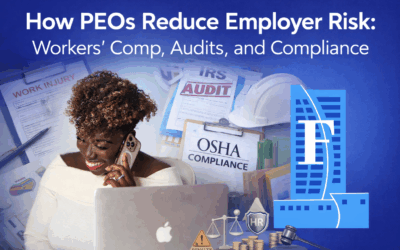Is your business ready to stay compliant with the updated labor laws and regulations of 2025?
To thrive in the competitive market for any business, it is important to stay compliant with the changing laws and regulations related to its employees. It also helps to avoid any legal pitfalls and related penalties while retaining good employees. This blog explores the top HR trends and compliance changes that will define 2025, helping businesses prepare for the future.
New labor laws and HR Trends to Recognize in 2025
Here are some of the important labor laws and compliance regulations you should know for the upcoming year:
Compliance Related to Remote and Hybrid Work
Remote and hybrid work arrangements are becoming permanent, and new rules are being introduced to address them. Employers must ensure the accurate tracking of remote employees’ work hours to prevent wage issues. Tax laws are also getting more complex for employees working across states or countries. Additionally, stricter data security standards are needed to protect sensitive information in remote setups.
Action Point: Update your remote work policies and invest in tools that ensure compliance with these new standards.
Pay Transparency and Wage Equity
The global push for pay equity and transparency is increasing, with 2025 expected to bring significant changes. Employers may need to disclose salary ranges in job postings, conduct regular pay audits to identify and fix wage gaps, and, in some cases, report pay data to authorities. These changes aim to ensure equal pay regardless of gender, race, or other factors.
Action Point: Conduct a pay equity audit to address gaps and align with evolving regulations.
AI in HR and Recruitment
AI tools are widely used in hiring, but they bring concerns about fairness. New laws will focus on preventing discrimination by ensuring these tools don’t favor or exclude candidates based on gender, race, or other characteristics. Transparency will also be required, meaning applicants must be informed when AI is used in hiring decisions. Regular audits of AI systems will be essential.
Action Point: Review and improve your AI-based HR tools to ensure they are fair and compliant and eliminate any bias.
Enhanced Employee Protections
Worker protection laws are expanding to promote safer and more inclusive workplaces. New policies will likely include broader definitions of workplace harassment, encompassing virtual harassment in remote work environments. Employers may face increased requirements for anti-discrimination and anti-harassment training, along with stronger whistle-blower protections to encourage reporting of workplace misconduct.
Action Point: Review your employee handbook and training programs to ensure compliance with these updated standards.
Mental Health and Well-Being Of Employees
Employee mental health is becoming a key focus area for policymakers. Mandated mental health benefits as part of wellness packages, policies to prevent burnout through mandatory rest periods and flexible scheduling, and initiatives to create psychologically safe workplaces are increasing. Companies are expected to prioritize inclusive leadership and cultural initiatives to support employee well-being.
Action Point: Collaborate with mental health providers and integrate wellness programs like an employee assistance program (EAP) into your HR strategy.
Sustainability and Employee Retention
Sustainability now extends beyond environmental concerns to include ethical and socially responsible workplace practices. Trends in this area include sustainable hiring practices that emphasize diversity and inclusion, corporate social responsibility (CSR) initiatives that report on sustainable labor practices, and green benefits such as commuter perks to reduce employees’ carbon footprints.
Action Point: Align HR practices with your company’s sustainability goals. Also, organize development opportunities like learning management software, training modules, etc. to help employees grow within the organization.
Employee Data Privacy and Protection
As businesses handle increasing amounts of employee data, compliance with data privacy laws will become even more critical. New developments include stricter consent requirements for data collection, adherence to global frameworks like GDPR, and the implementation of robust safeguards to prevent data breaches and misuse of information.
Action Point: Conduct a data privacy audit and update your policies to meet global standards.
HR Technology and Tools That Will Shape the Future of Workforce Management
- AI-Powered Recruitment Tools: Streamline hiring processes by identifying the best candidates faster.
- Learning Management Systems (LMS): Enable continuous employee upskilling through personalized training programs.
- Intranets: Enable employees to manage their own benefits plans.
- HRIS and HRMS: Manage employee data, track performance, and facilitate training and development.
Final Thoughts
The HR trends and compliance changes of 2025 represent both challenges and opportunities for businesses. By staying informed and proactive, HR professionals and employers can create workplaces that are not only compliant but also attractive to top talent. If you are looking for reliable HR services that take the time to resolve challenges specific to your organization, then contact us! To read more of our blogs, please visit our blog section.
Reference Links
Contact Us
Find out if a PEO is the right solution for your business.
Fill out the form below and we will contact you to schedule a chat.





